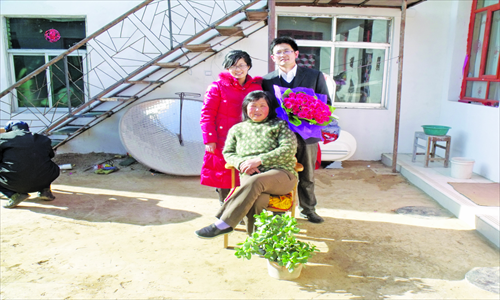Breaking mom out

On the 18th day after Zhao Meifu, 54, was sent to a re-education through labor center in Lanzhou, capital of Northwest China's Gansu Province, her son, Guo Dajun, was waiting anxiously outside the center, hoping the staff would let Zhao meet him and her lawyer.
But it turned out to be another disappointment for Guo, 29, a graduate student from the Beijing Institute of Technology. "They didn't even let me or the lawyer meet her, saying that the first month of re-education is fully closed," Guo told the Global Times.
On November 12, Zhao was taken away by officers from Gansu's liaison office in Beijing at the Beijing Railway Station as she was about to return home. Hours later, Guo was told that Zhao would be re-educated for a year, since her "inappropriate" petitioning in Beijing had severely disturbed the social order.
"My mother was in Beijing visiting me, and only registered at the Beijing office of letters and calls at her arrival for a possible response to her previous petitions. She didn't spread any flyers or kneel down in front of Chairman Mao's portrait at Tiananmen Square like other petitioners," said Guo, adding that his mom was once given a one-year re-education for petition in 2010, but was released 10 days later.
After filing a complaint demanding his mother's release from the center, Guo packed up his clothes and books, told his teacher that he would be absent during the final exam and left Beijing. "I won't give up."
Launched in 1957, the re-education system was a means of detention initially targeted at "counter-revolutionaries," prostitutes and drug addicts. The system entitles authorities to detain people for up to four years without trial.
According to the re-education through labor authority under the Ministry of Justice, by 2008, around 350 re-education centers held over 60,000 people across the country.
Silencing petitioners
Zhao started petitioning in 1989, shortly after her family's land was allegedly seized by village officials and their newly built house was demolished by neighbors in Lanzhou's Gaolan county. The Guos were the only family of that name in their village, leaving them vulnerable to the predations of others without clan support or relatives to back them up.
In 2007, after all her requests for an investigation were left unanswered by the city government of Lanzhou and the provincial government of Gansu, Zhao took the train to Beijing. Like many other petitioners, Beijing was her last shot.
Guo Yongchang, Zhao's husband, told the Global Times that the couple believes that the central government cares more about ordinary people.
But Guo Dajun has tried to dissuade his mother. "I heard petitioning in Beijing is so dangerous."
Zhao ended up getting detained by the Lanzhou re-education through labor committee in May 2010 after her 14th try in Beijing failed.
"The Lanzhou police took her away and sent a paper notice in the name of the local re-education through labor committee," said Guo Yongchang.
A source from the State Bureau of Letters and Calls told the Global Times that when they received cases from petitioners, especially those who have a long history, they would inform the Beijing office of the local government. Such liaison offices below the provincial and municipal level were closed under a State Council order of 2010.
"We would urge the local government to deal with the case," the source said.
"The most common means by which the local government adopted is to send petitioners for re-education and less than 0.2 percent of them have their problem solved," Yu Jianrong, a researcher and social activist from the Chinese Academy of Social Sciences, told the Global Times.
Yuan Yuan, head of the Lanzhou Bureau of Letters and Calls, told the Global Times that Zhao's continuous petitioning in Beijing has caused serious trouble for them. "We have repeatedly tried to persuade her to stop, but she refused to take our advice."
Liu Chunshan, an 80-year-old 39-time petitioner from Liaoning Province, has just been released after 18 months of detention. "It is another way of muting petitioners," Liu told the Xiaoxiang Morning Herald.
"I continued, and they ended up throwing me into the center," said Liu.
Sloppy decisions
In 2010, Zhao was freed after 10 days as the center said Zhao had heart disease, a decision the committee had no knowledge of.
"That was not true. She was and is healthy," Guo said, "I speculated that her release was because of the intensive media coverage of the case at that time."
But the family was confused when they received another printed re-education notice this time. The details were identical to the one given two years ago, with only the date at the bottom was corrected by handwriting.
Officials said the detention is valid for five years, meaning that "if my mother ever petitions again, she will be given the same order," Guo added.
However, Yuan said the decision was made based on completing Zhao's previously unfinished re-education, and conforms to legal procedures.
Zhang Weiyu, a lawyer helping Zhao, said it is unbelievable that local police would send such a sloppy order and that there is no regulation saying that a past order can be re-used.
Jiang Ping, former president at China University of Political Science and Law, told Caijing magazine Thursday that the re-education system should have been abolished a long time ago. "This is an example of the 'rule of man,' while only the 'rule of law' can help the country's judicial system achieve justice."
Guo suggested that Zhao should continue to petition during the period of the National People's Congress and the Chinese People's Political Consultative Conference in March 2013. "It would be a perfect time, when the newly elected leaders solve problems collectively."
"My mom never meant to cause any trouble when registering at the Beijing office, but local officials acted so quickly and didn't give her a chance to explain," Guo said.